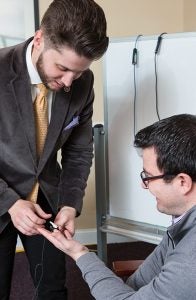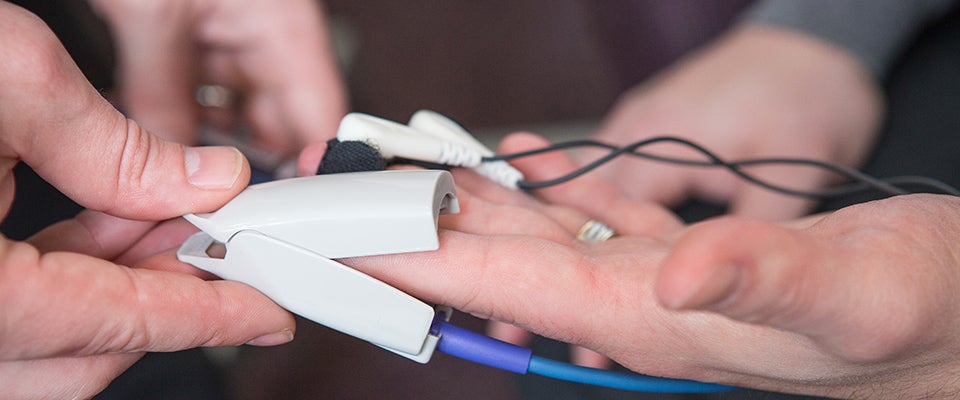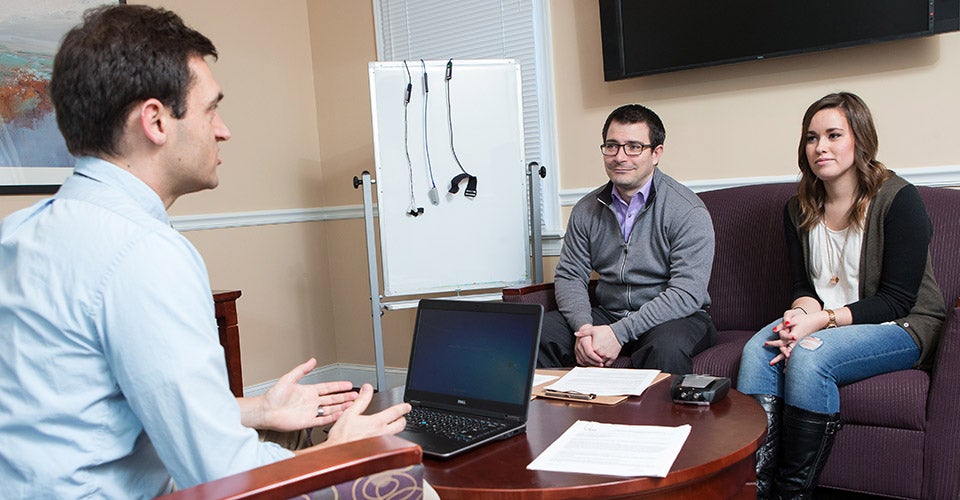CUPID’S CONFIDANTE
Study examines effects of confiding relationship problems
Dan Blocker is learning to pay more attention to where he turns, and why, when it comes to discussing disagreements with his wife.
Blocker, a medical family therapy doctoral student at East Carolina University, is serving as a graduate assistant on an ECU relationship study working to pinpoint how confiding in friends about relationship problems is linked to the overall quality of the relationship.
ECU Assistant Professors Jake Jensen, Department of Human Development and Family Science, and Matt Fish, Department of Recreation and Leisure Studies and Center for Applied Psychophysiology, have partnered to identify who couples talk to about their relationship problems and the physiological impact of sharing those problems.
“All couples experience some type of romantic challenge, and almost universally couples share these challenges with their friends to some extent,” Jensen said.
Discussing romantic problems with friends may enhance relationship quality if such problems are also discussed between the partners. But partners can harm their relationship when they turn more often to their friends to discuss their relationship problems, Jensen said.
Data has been collected from 80 college students between 18-30 years old, including Blocker. Participants are required to select a friend to join in the study, which is conducted at ECU’s Redditt House, home to the Medical Family Therapy Research Academy. Couples receive $50 and friends $35 for participation.
Couples and friends complete an online questionnaire and engage in a video-recorded conversation about a current or previous relationship problem. While discussing their relationship problems with each other and their friends, couples are connected to physiological equipment, which measures their breaths per minute, heart rate and the amount of sweat from the middle and ring fingers.

Dr. Matt Fish illustrates the biofeedback measurement tools used in his research examining the physiological effects of talking about romantic relationship problems.
“These physiological measures tell us what the body is saying,” Fish said. “Interestingly, when partners mention something that is offensive to one another or say something that sparks jealous feelings, the recipient of the negative comments may look calm on the outside, however, we see huge increases from the inside in their physiology, suggesting anxiety and stress.”
Individuals appear to display more negative emotions when discussing relationship problems with partners compared to discussions with friends.
“Conversations with friends seem happier, and more talking occurs,” Jensen said. “Friends share their own similar experiences. Discussing relationship challenges with friends may be less stressful, but turning more to friends than to one’s partner may be problematic long term for the relationship.”
The most common problem couples discuss is the lack of meaningful time together and the desire to spend less time on the telephone and social media.
Other trends Jensen has observed is the tendency of female friends to validate each other’s feelings, while males seek to provide concrete suggestions to help solve the problems.
Marriage and Family Therapy graduate student Meagan Collins began working on the project in September.
“It’s exciting to see first-hand and know that the information gathered from the study will help others better understand relationships,” Collins said.
“Being able to see how couples communicate with each other and their friends has reminded me to always be honest and keep communication lines open.”
The study is ongoing and researchers are actively recruiting more people to participate. For more information on enrolling, contact jakejresearch@gmail.com.

